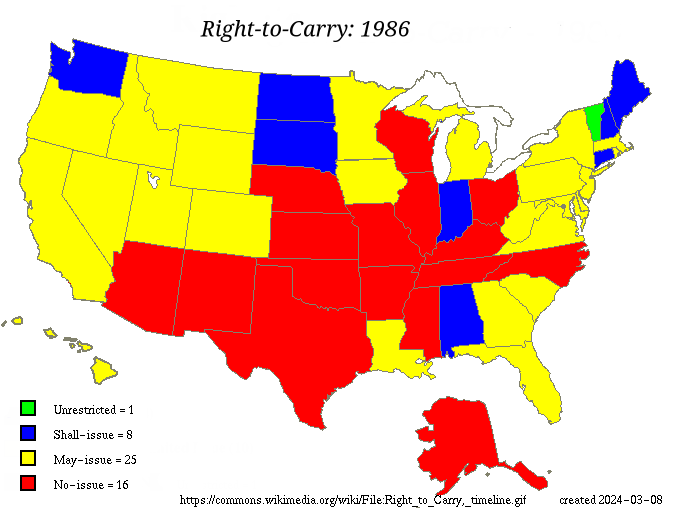Unrestricted is Constitutional Carry
Oklahoma Constitutional Carry, in the form of HB2597, is moving forward.
Here are part of the changes in the statutes. The Constitutional Carry law will remove the provisions of law that make it illegal to carry guns and knives for ordinary legal purposes.
A.Constitutional Carry in Oklahoma passed, with large majorities, in both houses in 2018. It was vetoed by Governor Mary Fallin.ItNotwithstanding any other provision of law, it shall be unlawful for any person to carry upon or about his or her person, or in a purse or other container belonging to the person, any pistol, revolver, shotgun or rifle whether loaded or unloaded or any blackjack, loaded cane, hand chain, metal knuckles, or any other offensive weapon, whether such weapon be concealed or unconcealed, except this section shall not prohibit:1. The proper use of guns and knives for self-defense,hunting, fishing, educational or recreational purposes;
In 2019, it has been re-introduced, has passed the House with a 70 to 30 vote, and has now passed the Senate Appropriations Committee, 18-4, with a recommendation for the full Senate to pass the bill. From ktul.com:
The vote was 18-4 in favor of the bill that says if you are over the age of 21 and NOT a convicted felon you are able to carry a firearm.There are 48 members of the Oklahoma Senate. The Senate has 39 Republicans and 9 Democrats. Last year, Constitutional Carry passed the Senate with a 33-8 vote. It seems likely the Senate will pass HB2597.
It also states that if you are over the age of 18 are an active duty member of the military or National Guard or have been honorably discharged you can also carry.
Governor Kevin Stitt (R) has repeatedly said he will sign the bill, with a caveat that he will insure there are no major changes in the it, presumably, compared to last year.
Depending on who makes the count, and how Constitutional Carry is defined, there are now 14 states that have restored Second Amendment rights to an approximation of what they were when the Second Amendment was ratified in 1791. No permits were required to carry weapons concealed or openly at that time.
Vermont has always had Constitutional Carry since 1791.
In 2003, Alaska passed Constitutional Carry to restore the exercise of Second Amendment rights.
In 2010, Arizona passed Constitutional Carry.
In 2011, Wyoming passed Constitutional Carry.
In 2013, Arkansas passed Act 746 into law. It is effectively Constitutional Carry. Some county prosecutors threaten prosecution, but it has not happened.
In 2015, Kansas, and Maine became Constitutional Carry club members.
In 2016, Idaho, Missouri, West Virginia, and Mississippi became Constitutional Carry states.
In 2017, New Hampshire, and North Dakota were passed Constitutional Carry.
In 2019, South Dakota passed Constitutional Carry.
Oklahoma is the most likely to pass Constitutional Carry next.
If Oklahoma passes Constitutional carry, 30% of the states will have restored the Second Amendment right to carry, or a reasonable facsimile thereof.
Kentucky, Alabama, Iowa, Texas, Georgia, South Carolina, Ohio, and Michigan all have some movement on Constitutional Carry bills. Most bills will die in the legislative process, but one to three more states could plausibly restore Constitutional Carry in 2019.
©2019 by Dean Weingarten: Permission to share is granted when this notice and link are included.
Gun Watch





3 comments:
If you have to buy a license/permit, get someone's permission, or pay for "training" before you can exercise a right then it's not a right.
Not how constitutional rights work in practice. For example, if you want to exercise your free speech right to demonstrate, a town can still make you get a permit and hold the demonstration in a park instead of in the middle of the road. You're also not allowed to yell Fire in a crowded theater or defame someone, even though we have a right of FREE SPEECH in the 1st amendment. Same applies to every constitutional right. It's not absolutely unfettered.
Dear Carl, Read the second amendment Shall Not be infringed strips the fettering out. Shall Not in legal terms is an absolute command. the constitution is the supreme law of this land therefore Shall Not Be Infringed is a legal block to any infringements Infringe includes anything related to an issue. there are no valid gun laws because the constitution forbids infringements.
Post a Comment